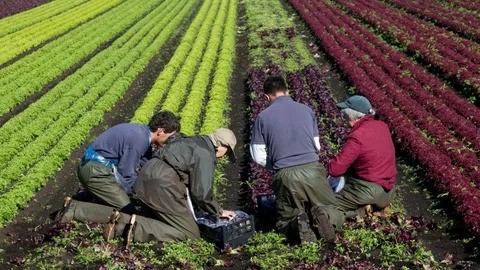Farm Jobs in Canada
Canada is known for its vast agricultural landscapes, producing a wide range of crops and livestock that contribute significantly to the country’s economy. With its fertile soil, diverse climate, and commitment to sustainable farming practices, Canada offers numerous opportunities for individuals looking to work in the agricultural sector. This article explores farm jobs in Canada, highlighting the types of positions available, the skills and qualifications needed, and the benefits and challenges of working in this rewarding field.
1. Overview of the Agriculture Industry in Canada
The agriculture industry in Canada is a vital part of the economy, contributing over CAD 30 billion annually. The country is one of the world’s leading exporters of agricultural products, including wheat, canola, barley, and dairy products. With over 190,000 farms across the nation, agriculture employs approximately 2% of the Canadian workforce, making it a significant source of employment, particularly in rural areas.
Canada’s agricultural landscape is diverse, with various regions specializing in different crops and livestock due to the country’s varying climate and soil types. For instance, the Prairie Provinces (Alberta, Saskatchewan, and Manitoba) are known for their grain production, while British Columbia and Ontario focus on fruit and vegetable farming. The Maritimes are known for their seafood and dairy products, showcasing the rich agricultural diversity across the country.
2. Types of Farm Jobs in Canada
Farm jobs in Canada encompass a wide range of positions, each requiring different skills and levels of expertise. Here are some of the most common types of farm jobs available:
a. Farm Laborer
Farm laborers perform a variety of tasks, including planting, cultivating, and harvesting crops, as well as feeding and caring for livestock. These entry-level positions often require physical stamina and a willingness to work outdoors in various weather conditions.
- Responsibilities: Planting and harvesting crops, maintaining equipment, caring for livestock, and assisting with general farm operations.
- Skills Needed: Physical fitness, basic knowledge of farming practices, and the ability to work as part of a team.
b. Equipment Operator
Equipment operators are responsible for operating machinery used in farming, such as tractors, combine harvesters, and irrigation systems. These positions often require specialized training and a valid driver’s license.
- Responsibilities: Operating farm machinery, maintaining equipment, and ensuring that tasks are completed efficiently and safely.
- Skills Needed: Mechanical skills, knowledge of machinery operation, and attention to detail.
c. Farm Manager
Farm managers oversee the daily operations of a farm, including managing staff, budgeting, and making strategic decisions regarding crop and livestock production. This role requires a strong understanding of agricultural practices and business management.
- Responsibilities: Planning and coordinating farm activities, managing finances, supervising staff, and ensuring compliance with regulations.
- Skills Needed: Leadership skills, financial acumen, and knowledge of agricultural practices.
d. Agronomist
Agronomists are specialists who study soil, crops, and agricultural practices to improve farming methods and crop yields. They often work for government agencies, research institutions, or private companies.
- Responsibilities: Conducting research, providing recommendations to farmers, and developing sustainable farming practices.
- Skills Needed: Strong analytical skills, knowledge of plant science, and the ability to communicate findings effectively.
e. Livestock Handler
Livestock handlers care for farm animals, ensuring their health and well-being. This role involves feeding, cleaning, and monitoring the animals, as well as assisting with breeding and health care.
- Responsibilities: Feeding and caring for animals, monitoring their health, and assisting with breeding programs.
- Skills Needed: Animal husbandry knowledge, patience, and strong observational skills.
f. Greenhouse Worker
Greenhouse workers are responsible for maintaining the conditions necessary for plant growth within controlled environments. This role may involve planting, watering, fertilizing, and harvesting plants grown in greenhouses.
- Responsibilities: Planting and caring for plants, managing greenhouse conditions, and harvesting produce.
- Skills Needed: Knowledge of plant care, attention to detail, and the ability to work in a team.
3. Requirements for Farm Jobs in Canada
While many farm jobs do not require formal education, specific skills and qualifications can enhance your employability. Here’s a breakdown of the typical requirements for various farm positions:
a. Education and Training
- High School Diploma: While not always mandatory, having a high school diploma can improve your job prospects. Some positions, like farm management or agronomy, may require further education.
- Post-Secondary Education: Degrees or diplomas in agriculture, horticulture, or animal science can be beneficial for advanced positions.
b. Experience
- Entry-Level Positions: Many farm laborer roles require little to no experience. On-the-job training is often provided, allowing new workers to learn essential skills.
- Advanced Positions: Roles such as farm managers and agronomists usually require prior experience in agriculture or a related field.
c. Skills
- Physical Fitness: Many farm jobs require manual labor and the ability to work outdoors for long periods.
- Technical Skills: Operating machinery or understanding farming technology may require specific training or certifications.
- Communication Skills: Effective communication is essential for working with team members and understanding instructions.
4. Benefits of Working on a Farm
Working on a farm offers several benefits, making it an appealing career choice for many individuals:
a. Job Security
With the constant demand for food production and agricultural products, farm jobs are often stable and secure. As the population grows, so does the need for skilled workers in agriculture.
b. Work Environment
Farm jobs provide an opportunity to work outdoors and engage with nature, which many people find fulfilling. The scenery and tranquility of rural areas can be a refreshing change from office work.
c. Skill Development
Working on a farm allows individuals to develop a diverse skill set, from operating heavy machinery to understanding crop management. These skills can lead to various career paths within the agricultural sector.
d. Community and Culture
Agriculture fosters a strong sense of community. Many farms are family-owned and operated, creating a unique work environment where employees can build lasting relationships with coworkers and local farmers.
e. Opportunities for Advancement
There are numerous opportunities for advancement within the agriculture industry. With experience and additional training, workers can progress to management positions or specialize in areas like agronomy or livestock management.
5. Challenges of Working on a Farm
While farm jobs offer many benefits, there are also challenges to consider:
a. Seasonal Work
Many farm jobs are seasonal, especially those related to planting and harvesting. This can lead to periods of unemployment during the off-season unless workers find other employment or additional income streams.
b. Physical Demands
Farming can be physically demanding and may require long hours of manual labor. Workers must be prepared for the physical challenges that come with the job.
c. Weather Dependence
Farm work is often highly dependent on weather conditions. Rain, drought, or extreme temperatures can affect crop yields and working conditions, making the job unpredictable.
d. Health and Safety Risks
Working with heavy machinery and animals poses health and safety risks. Proper training, adherence to safety protocols, and protective gear are essential to minimize these risks.
6. Where to Find Farm Jobs in Canada
Finding farm jobs in Canada can be accomplished through various channels. Here are some effective methods to help you secure a position:
a. Online Job Boards
Many websites specialize in agricultural job listings, including general job boards like Indeed, Workopolis, and specialized sites like AgCareers.com or FarmAndFoodCare.org. These platforms often have a variety of farm job listings across Canada.
b. Local Employment Agencies
Local employment agencies may have connections with farms in your area looking for workers. These agencies can help match your skills with available job opportunities.
c. Networking
Building a network within the agricultural community can help you discover job openings. Attend agricultural fairs, industry events, or local farmer’s markets to meet farmers and industry professionals who may know of job opportunities.
d. Direct Applications
Many farms prefer to hire workers directly, so consider visiting farms in your area to inquire about job openings. Bringing a resume and expressing genuine interest can make a positive impression.
e. University and College Career Services
If you’re studying agriculture or a related field, take advantage of your institution’s career services. They often have connections with farms and agricultural businesses looking for students or graduates.
7. Tips for Success in Farm Jobs
If you’re considering a career in farming, here are some tips to help you succeed:
a. Be Willing to Learn
Farming practices are continually evolving. Be open to learning new skills and adapting to changing technologies and methods.
b. Stay Physically Fit
Physical fitness is crucial in farming. Engage in regular exercise to build stamina and strength, preparing yourself for the physical demands of the job.
c. Build Strong Relationships
Establishing good relationships with coworkers and supervisors can enhance your work experience and create a supportive work environment.
d. Stay Informed
Stay updated on agricultural trends, practices, and regulations. Knowledge of the industry can enhance your effectiveness on the job and open doors to advancement.
Farm Jobs in Canada
Farm jobs in Canada provide a unique opportunity for individuals seeking rewarding and fulfilling work in the agricultural sector. With a diverse range of positions available, from entry-level labor to specialized roles like agronomy, there are numerous pathways to build a successful career in agriculture.
While farm work comes with its challenges, the benefits of job security, skill development, and a strong sense of community make it an appealing choice for many. Whether you’re a recent graduate or looking for a career change, exploring farm jobs in Canada could lead you to a fulfilling and meaningful career in one of the country’s most vital industries.
As you consider a career in farming, remember to research the various opportunities available, assess your skills and interests, and take proactive steps to secure a position in this rewarding field. The future of agriculture in Canada is bright, and there’s a place for dedicated individuals ready to contribute to this essential industry.



